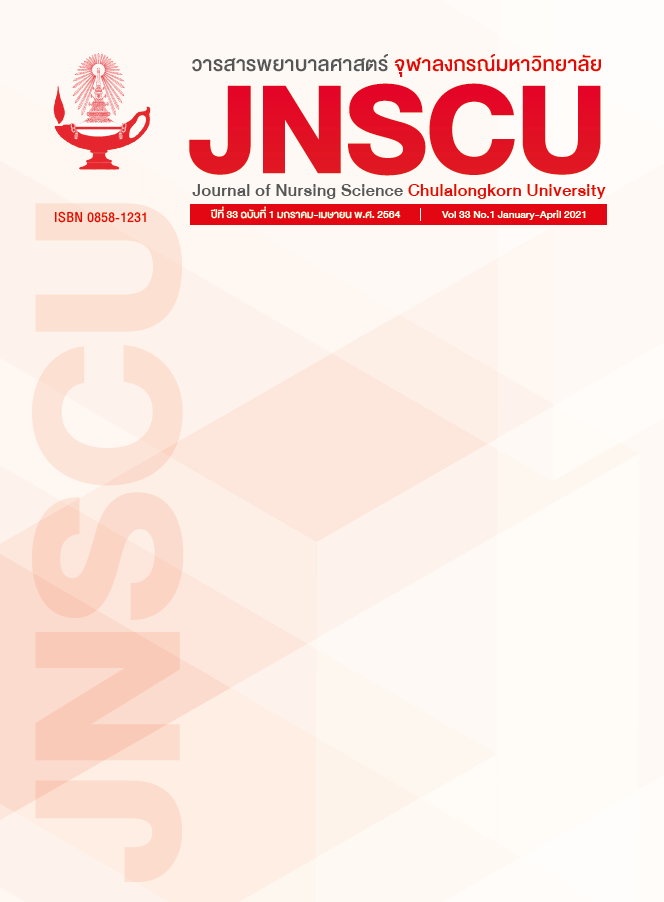ผลของการสอนแนะพฤติกรรมการเลี้ยงดูของครอบครัว ต่ออาการออทิสติกของเด็กออทิสติกวัยก่อนเรียน
คำสำคัญ:
การสอนแนะพฤติกรรมการเลี้ยงดู, อาการออทิสติก, เด็กออทิสติกวัยก่อนเรียนบทคัดย่อ
วัตถุประสงค์: เพื่อเปรียบเทียบอาการออทิสติกของเด็กออทิสติกวัยก่อนเรียนก่อนและหลังได้รับการสอนแนะพฤติกรรมการเลี้ยงดูของครอบครัว และเปรียบเทียบอาการออทิสติกของเด็กออทิสติกวัยก่อนเรียนระหว่างกลุ่มที่ได้รับการสอนแนะพฤติกรรมการเลี้ยงดูของครอบครัวกับกลุ่มที่ได้รับการพยาบาลปกติ
รูปแบบการวิจัย: การวิจัยกึ่งทดลอง
วิธีดำเนินการวิจัย: กลุ่มตัวอย่าง คือ เด็กออทิสติกอายุ 3-6 ปี และครอบครัวที่มารับบริการที่แผนกผู้ป่วยใน สถาบันราชานุกูล ซึ่งมีคุณสมบัติตามเกณฑ์ โดยได้รับการจับคู่ (Matched pair) และการสุ่มเข้ากลุ่มทดลองและกลุ่มควบคุม จำนวนกลุ่มละ 20 คู่ กลุ่มทดลองได้เข้าร่วมการสอนแนะพฤติกรรมการเลี้ยงดูของครอบครัวต่ออาการออทิสติกของเด็กออทิสติกวัยก่อนเรียนเป็นระยะเวลา 6 สัปดาห์ ส่วนกลุ่มควบคุมได้รับการพยาบาลตามปกติ เครื่องมือที่ใช้ในการทดลอง คือ คู่มือการสอนแนะพฤติกรรมการเลี้ยงดูของครอบครัวสำหรับพยาบาล และคู่มือการดูแลเด็กออทิสติกสำหรับครอบครัว เก็บข้อมูลโดยใช้แบบประเมินอาการรุนแรงของโรคออทิสซึม แบบประเมินความสามารถของครอบครัวในการเลี้ยงดูเด็กออทิสติก มีค่าดัชนีความตรงตามเนื้อหาเท่ากับ .87 และ .88 ตามลำดับ และมีค่าความเที่ยงสัมประสิทธิ์แอลฟาครอนบาค เท่ากับ .92 และ .89 ตามลำดับ วิเคราะห์ข้อมูลโดยใช้สถิติทดสอบที (t-test)
ผลการวิจัย: 1) อาการออทิสติกของเด็กออทิสติกวัยก่อนเรียนหลังได้รับการสอนแนะพฤติกรรมการเลี้ยงดูของครอบครัวน้อยกว่าก่อนได้รับการสอนแนะอย่างมีนัยสำคัญทางสถิติที่ระดับ .00 และ 2) อาการออทิสติกหลังการทดลองของเด็กออทิสติกวัยก่อนเรียนที่ได้รับการสอนแนะพฤติกรรมการเลี้ยงดูของครอบครัวลดลงมากกว่ากลุ่มที่ได้รับการพยาบาลตามปกติแต่ไม่แตกต่างกัน
สรุป: การสอนแนะพฤติกรรมการเลี้ยงดูของครอบครัวช่วยให้อาการออทิสติกของเด็กออทิสติกวัยก่อนเรียนลดลงได้
เอกสารอ้างอิง
Sujaritpong S, Rungpriwan R, Huunkunachai
T, Benjasuwaanthep, fueangfuu A,
Juthapisit J et al. Textbook of Child
Development and Behavior. Vol. 4th ed.
Bangkok: Child Development and
Behavior Society of Thailand; 2018.
World Health Organization. Autism spectrum
disorders [internet]. 2021 [Cited 2019
Jul 27]. Available from: https://www.
who.int/news-room/fact-sheets/detail/
autism-spectrum-disorders
Chantayanon C. More than 3,000 autistic
children outside the system advise how
parents care [internet]. 2012 [Cited 2019
March 15]. Available from: http://www.
autisticthai.com/attach/knowledge_
_Roadmap.pdf
Medical Statistics of Rajanukul Institute.
Annual Report. Bangkok: Rajanukul
Institute; 2018.
Rimland B, Edelson SM. Autism Treatment
Evaluation Checklist (ATEC) [internet].
[Cited 2019 March 15]. Available
from: https://psycnet.apa.org/doi
Landing?doi= 10.10 37%2Ft03995-000
Prizant BM, Wetherby AM. Critical Issues in
Enhancing Communication Abilities for
Persons with Autism Spectrum Disorders.
In Volkmar R, Paul A, Klin, Cohen D,
editors. Handbook of autism and
pervasive developmental disorders:
Assessment, interventions, and policy.
USA: John Wiley & Sons, Inc.; 2005.
pp. 925-45.
Lane AE, Young RL, Baker AE, Angley MT.
Sensory processing subtypes in autism:
Association with adaptive behavior.
Journal of autism and developmental
disorders 2010; 40(1): 112-22.
Matson JL, Nebel-Schwalm MS. Comorbid
psychopathology with autism spectrum
disorder in children: An overview.
Research in developmental disabilities
; 28(4): 341-52.
Gupta VB. Autistic spectrum disorders in
children. New York: Marcel dekker; 2004.
Netthaworn Y, Chapman RS. Factors
Affecting Development of Children
Aged 3-5 Years in Muangphrai Primary
Care Unit, Selaphum District, Roi-Et
Province, Thailand. Journal of Health
Research 2010; 24(suppl2): 41-6.
Wangtrakul A, Vanindananda N, Yoelao D,
Khosuwang K. The Psychological and
Situational Correlates of Austictic
Child-Rearing Behavior in Mothers
[Master’s thesis in Science Program].
Srinakharinwirot University; 2007.
Meirsschaut M, Roeyers H, Warreyn P.
Parenting in families with a child with
autism spectrum disorder and a typically
developing child: Mothers’ experiences
and cognitions. Research in Autism
Spectrum Disorders 2010; 4(4): 661-9.
Girvin, J. Coaching for improving job
performance and satisfaction. Nursing
times 1999; 95(50): 55-7.
Tongkhammak S, Jeerapat W. Effects of
coaching program for enhancing
newborn rearing behavior of mother on
preterm infant’s health outcomes
[Master’s thesis in Nursing Program].
Bangkok: Chulalongkorn University;
Threesoon P, Rodkhamdee P. The effect of
maternal coaching program on caring
behaviors for toddler with pneumonia
[Master’s thesis in Nursing Program].
Bangkok: Chulalongkorn University;
Poclung C. The scientific basic of coaching.
Bangkok: Odeain Store; 1989.
Krejcie RV, Morgan DW. Determining sample
size for research activities. Educational
and psychological measurement 1970;
(3): 607-10.
Monthawee S, Tato R. The effect of coaching
program on maternal behavior to
prevent breast feeding jaundice in full
term neonate [Master’s thesis in Nursing
Program]. Bangkok: Chulalongkorn
University; 2011.
Punphong S, Yunibhan J, Suktrakul S. The
effect of enhancing family caregiving
ability program on autistic symptoms
among autistic preschoolers [Master’s
thesis in Nursing Program]. Bangkok:
Chulalongkorn University; 2018.
ดาวน์โหลด
เผยแพร่แล้ว
ฉบับ
ประเภทบทความ
สัญญาอนุญาต

อนุญาตภายใต้เงื่อนไข Creative Commons Attribution-NonCommercial-NoDerivatives 4.0 International License.
##default.contextSettings.thaijo.licenseTerms##


